Looking for eco-friendly bag suppliers? In 2025, sustainability certifications aren’t optional – they’re a must. Certifications like GRS, OEKO-TEX® STANDARD 100, and FSC ensure your supplier meets strict environmental and safety standards. Here’s what you need to know:
- Global Recycled Standard (GRS): Requires at least 20% recycled materials and enforces social and environmental audits.
- OEKO-TEX® STANDARD 100: Tests for over 1,000 harmful substances to ensure product safety.
- FSC Certification: Verifies responsibly sourced plant-based materials like bamboo and paper.
New for 2025:
- BlueSign®: Focuses on eliminating harmful PFAS chemicals in sports materials.
- Cradle to Cradle Certified®: Evaluates materials for circularity and environmental impact.
- USDA BioPreferred®: Promotes renewable materials and reduces petroleum use.
Why it matters: 90% of consumers prefer sustainable packaging, and 66% are willing to pay extra for eco-friendly products. To stay competitive, ensure your suppliers are certified, transparent, and up-to-date with these standards.
7 Sustainability Certifications You Should Know
Must-Have Certifications in 2025
By 2025, bag suppliers will need to secure three key certifications to demonstrate their commitment to sustainable practices and compliance with regulations.
Global Recycled Standard (GRS) Requirements
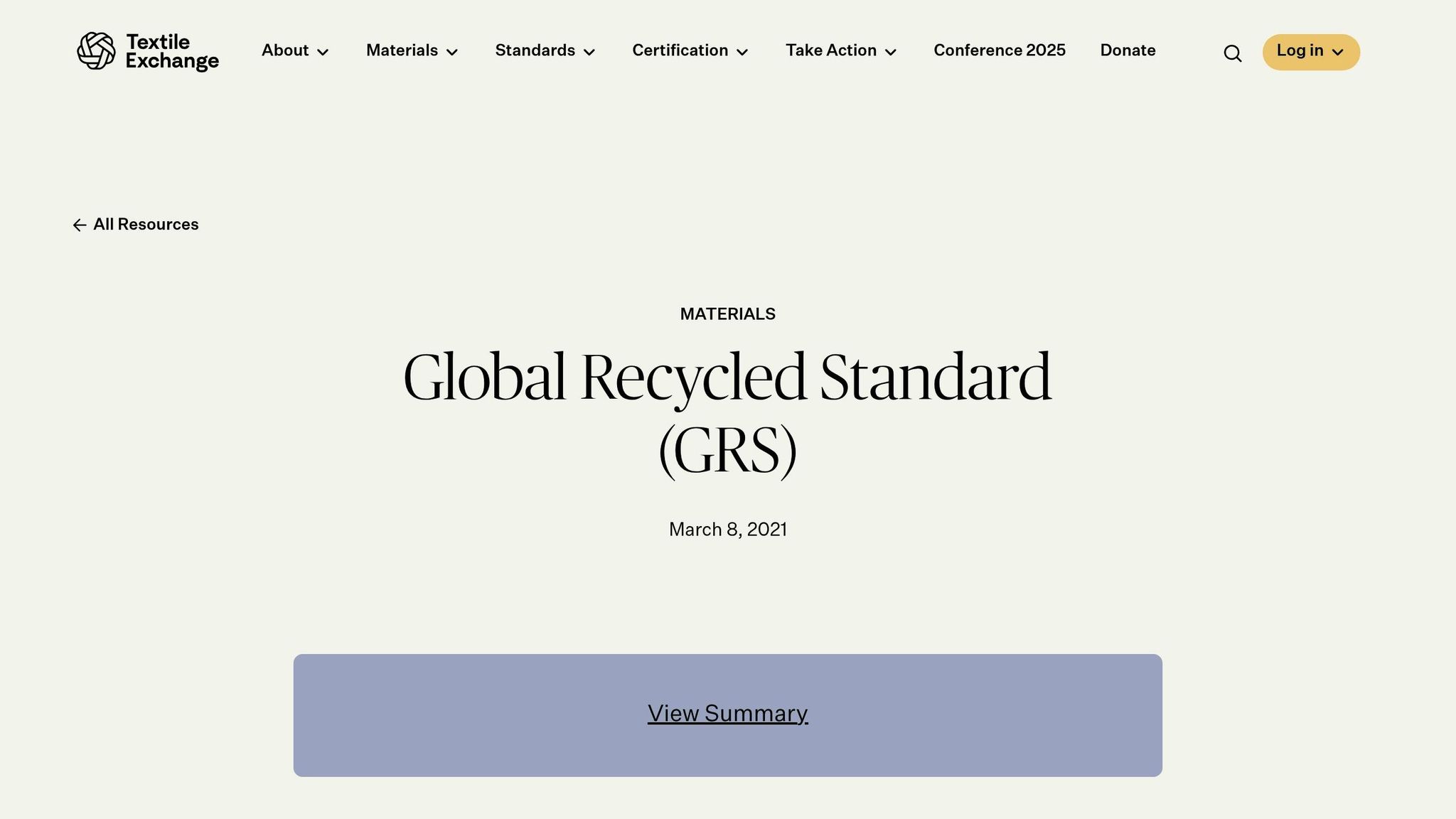
The Global Recycled Standard (GRS) certification ensures that products contain a minimum of 20% recycled material, with at least 50% recycled content required for consumer labeling. This is rigorously verified through third-party audits and detailed chain-of-custody documentation. The certification also evaluates social and environmental practices across the production process, making it a comprehensive standard for sustainability.
Additionally, it enforces strict safety protocols for textile components, ensuring that every part of the product meets regulatory standards.
OEKO-TEX® STANDARD 100 Guidelines
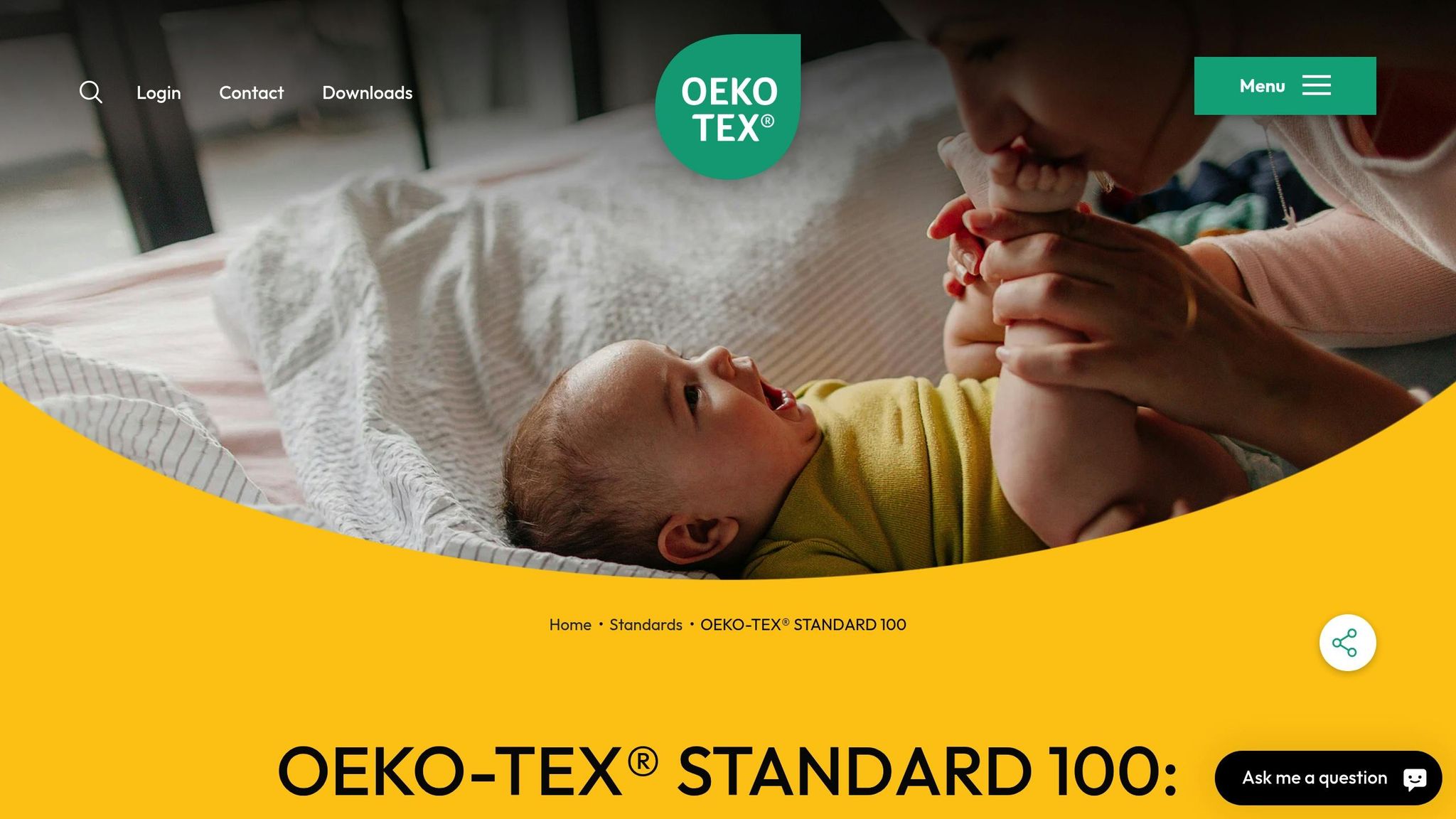
The OEKO-TEX® STANDARD 100 certification guarantees that every component of a bag – right down to the smallest detail – has been tested for harmful substances. With over 21,000 certificates issued globally, this certification reflects widespread industry adoption. Materials are tested against a list of over 1,000 restricted substances, ensuring that products meet stringent safety and responsibility standards.
For suppliers incorporating plant-based materials, another certification plays a crucial role in ensuring sustainability.
FSC Certification Standards
The Forest Stewardship Council (FSC) certification confirms that plant-based materials like paper and bamboo are sourced from responsibly managed forests with transparent supply chains. Consumers are increasingly drawn to sustainable options, and the data backs it up:
| Consumer Behavior | Percentage |
|---|---|
| Prefer products that don’t harm plants/animals | 86% |
| Want independent sustainability certification | 76% |
| Choose FSC-certified over non-certified products | 77% |
"FSC certified products mark the start towards a more sustainable fashion future." – Weavabel
Research also highlights that 80% of consumers who recognize the FSC label trust brands offering FSC-certified products more. This makes FSC certification not just a sustainability marker but also a trust-building tool for brands.
New Certifications Coming in 2025
In 2025, three new certifications are set to reshape the way sustainable bag manufacturing is approached, raising the bar for environmental responsibility and product safety. These certifications build on existing standards to push the industry further toward eco-friendly and safe production practices.
BlueSign® Standards for Sports Materials
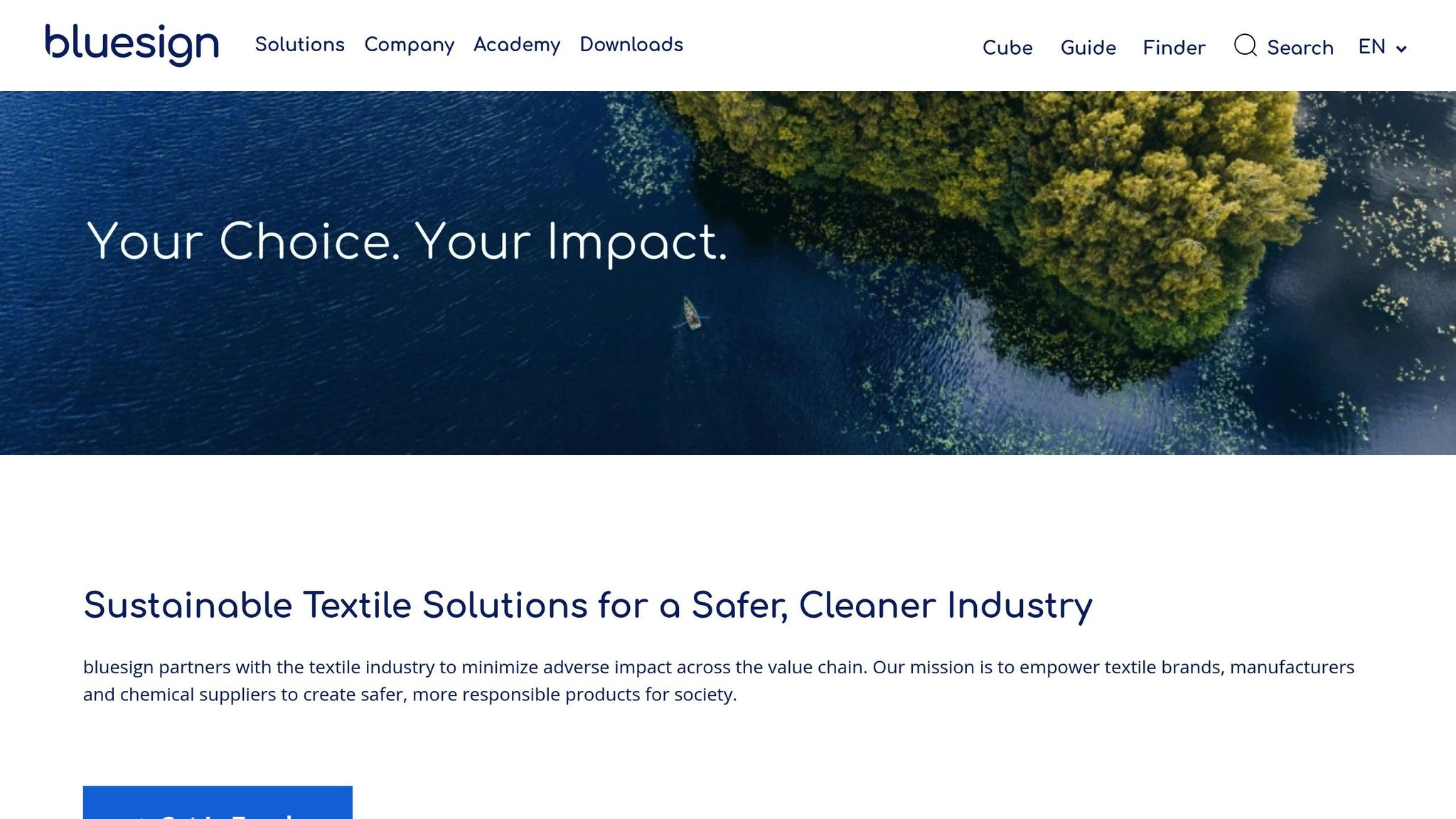
The BlueSign® certification has become a key standard for sports and performance materials used in bag manufacturing. By January 1, 2025, all BlueSign® APPROVED products must be produced without the intentional use of PFAS, a significant step toward safer and cleaner production. In 2023, BlueSign® reported impressive environmental savings:
| Environmental Impact (2023) | Reduction Amount |
|---|---|
| Water Savings | 6.29 billion liters |
| Energy Conservation | 773.57 million kWh |
| Carbon Reduction | 3.27 billion kg |
These figures are based on BlueSign’s 2023 calculations.
"The holistic bluesign® approach helps us measure our impact, set clear targets, and reduce our environmental impact significantly where it matters the most; in the dyeing and finishing processes. We are proud to have increased the share of bluesign products to over 60% in the past ten years. Our goal is to achieve 90% by 2025. bluesign® is pivotal in achieving our ambitious sustainability and climate targets."
– Adrian Huber, Head of Corporate Responsibility at Mammut
In addition to BlueSign®, the Cradle to Cradle Certified® process is another certification advancing sustainable product design.
Cradle to Cradle Certified® Process
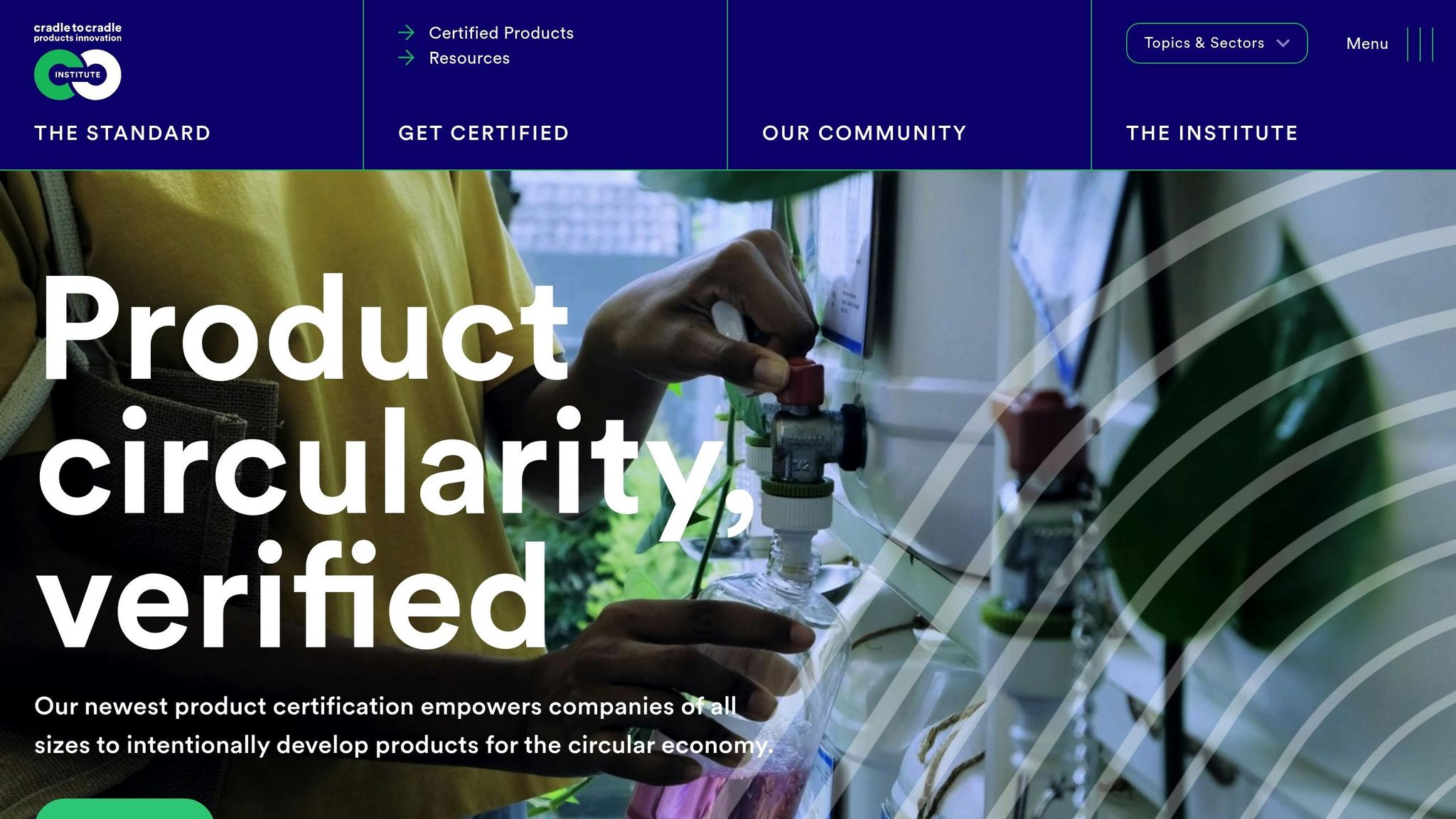
The Cradle to Cradle (C2C) Certified® program, updated to version 4.1 in July 2024, evaluates products across five key areas: Material Health, Product Circularity, Clean Air & Climate Protection, Water & Soil Stewardship, and Social Fairness. Certification levels include Bronze, Silver, Gold, and Platinum, with recertification required every three years to ensure ongoing progress.
Costs for certification vary, with annual fees ranging from $1,250 for small businesses to $17,500 for larger companies. Initial certification fees are $5,650, and recertification costs $3,700. This tiered system encourages companies of all sizes to participate in sustainable design.
While material and design certifications are essential, programs like the USDA BioPreferred® initiative are driving innovation in renewable resources.
USDA BioPreferred® Program
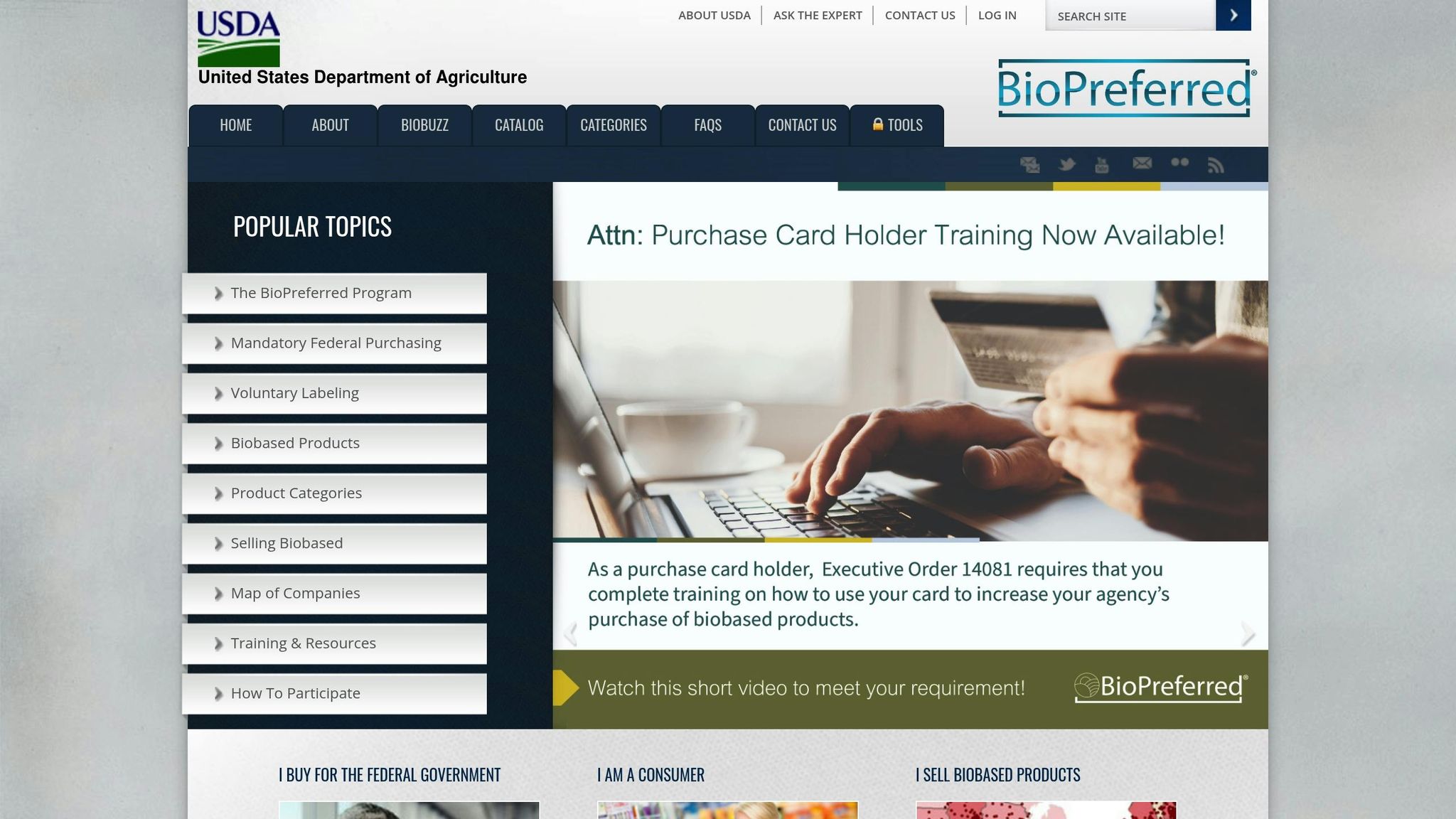
The USDA BioPreferred® Program focuses on increasing the use of renewable materials in bag manufacturing by certifying products with USDA-verified renewable biological content. The biobased sector contributes $369 billion annually to the U.S. economy and supports 4 million jobs.
Environmental benefits include:
- Replacing 300 million gallons of petroleum annually
- Cutting carbon emissions equivalent to removing 200,000 cars from the road
To earn certification, manufacturers must test their products at independent laboratories to confirm biobased content levels. This program also encourages the development of innovative materials, such as biobased leather, coatings, and alternatives like wheat straw.
sbb-itb-1e6451b
Checking Supplier Certification Status
Required Certification Documents
To validate a supplier’s sustainability claims, certain documents are essential. These documents fall into three main categories:
| Document Category | Required Items |
|---|---|
| Core Certifications | – GRS Certificate, Scope – OEKO-TEX® Certificate – FSC Chain of Custody – BlueSign® System Partner Certificate |
| Supply Chain Verification | – Material Flow Charts – Supplier Declarations – Bill of Materials (BOM) – Process Flow Diagrams |
| Quality Assurance | – Test Reports – Internal Audit Reports – Corrective Action Reports – Chemical Management Records |
It’s important to check both the expiration dates and the specific scopes of these certifications. For example, in March 2023, Textile Exchange updated its Alternative Volume Reconciliation (VR2) policy to include gasification. This means suppliers’ GRS certifications must align with these new requirements.
"Certifications are crucial to supporting traceability commitments in the apparel industry because they build trust, validate sustainability claims and provide transparency across the supply chain."
- Meredith Boyd, Chief Product Officer, UNIFI, makers of REPREVE
While reviewing documents is critical, digital tools now make it easier to check certification statuses instantly.
Online Certification Tracking
Digital platforms are transforming how certifications are verified, offering real-time updates and reducing the reliance on manual document checks. A prime example is the Forest Stewardship Council’s FSC Trace platform, which is set to launch its beta version in May 2025. This blockchain-based system provides instant tracking of certified materials during transactions.
Here are some key platforms that support online certification tracking:
- FSC Trace Platform
Focused on EUDR compliance, it connects trading partners, facilitates product configuration, and ensures real-time tracking. - TÜV Rheinland‘s Certipedia
Allows users to verify certificate IDs, access product details, and review system certifications. - UL Solutions‘ Product iQ®
Provides extensive data access and up-to-date verification of certifications.
When evaluating certification claims, be alert to potential warning signs, such as:
- Reluctance to share official certification details
- Confusing or inconsistent communication about certification status
- Certificates that fail to match official registry records
- Expired certifications without renewal proof
"If you have a supplier that is unable to provide transparent performance information, is not improving, or has mitigation plans that are the same over a long period of time, then they may not have the capabilities to achieve success."
- Josh Mellinger, ESG board member and strategic advisor for reThink Purpose
Conclusion: Meeting 2025 Certification Standards
Sustainability is no longer a choice – it’s a necessity, especially with certifications becoming mandatory in 2025. Consider this: 90% of consumers are more likely to purchase from brands using sustainable packaging, and 66% of U.S. consumers – rising to 80% among younger adults – are willing to pay extra for sustainable products. These numbers highlight why verifying supplier certifications is not just a compliance issue but a strategic advantage.
When evaluating suppliers, focus on these key areas:
| Focus Area | Key Requirements |
|---|---|
| Documentation | Certification records, material flow charts, and test reports must be complete. |
| Verification | Third-party audits, transparent supply chains, and regular monitoring are vital. |
| Digital Tracking | Real-time updates on certification status ensure accountability. |
| Supplier Engagement | Maintain open communication, conduct facility visits, and establish NDAs. |
These criteria provide a solid framework for assessing suppliers effectively. Research further shows that investing in certifications pays off – products with environmental and social governance claims outperform their uncertified counterparts, with two-thirds of product categories experiencing faster growth for certified options.
To maintain credibility and avoid greenwashing – a growing concern as 42% of green claims in Europe were found to be misleading – ongoing audits and meticulous documentation reviews are essential. Making these practices routine helps uphold certification integrity and ensures that sustainability claims remain transparent and trustworthy.
FAQs
What new eco-certifications should bag suppliers know about in 2025, and why do they matter?
In 2025, new eco-certifications like the APR PCR Certification and updated compostability standards such as EN 13432 and ASTM D6400 are raising the bar for sustainability in the bag industry. These certifications focus on using environmentally friendly materials, managing waste responsibly, and complying with internationally recognized environmental guidelines.
For bag suppliers, meeting these standards isn’t just about environmental responsibility – it’s about staying relevant in a market where consumers are prioritizing sustainable choices. Aligning with these certifications not only helps reduce environmental impact but also strengthens trust with eco-conscious buyers, ensuring businesses remain competitive in a world that increasingly values sustainability.
How can I confirm that my bag supplier has the right eco-certifications and verify their authenticity?
To ensure your bag supplier holds valid eco-certifications, begin by requesting official documentation or certificates directly from them. Once you have these, look up the certifying organization mentioned on the documents. Visit their official website to confirm that the supplier is listed as certified.
It’s also a good idea to familiarize yourself with the certification standards. Certifications like GRS, OEKO-TEX, and FSC are known for their rigorous criteria regarding sustainable materials and ethical practices. Understanding these standards can help you evaluate whether the supplier aligns with your sustainability goals. If you’re uncertain, don’t hesitate to reach out to the certifying organization for verification.
By taking these steps, you can confidently ensure that your supplier adheres to recognized eco-friendly practices and industry requirements.
Why do bag suppliers need eco-certifications, and how do they impact consumer choices?
Eco-certifications play a crucial role for bag suppliers by verifying that their products adhere to sustainability and ethical standards. For instance, the Global Recycled Standard (GRS) confirms that materials are responsibly recycled, while OEKO-TEX ensures products are safe and free from harmful substances. These badges of approval help establish trust with consumers, especially as sustainability becomes a growing priority.
Studies indicate that a significant number of consumers are willing to spend more on eco-friendly products. This makes certifications a powerful influence on purchasing decisions. Partnering with certified suppliers allows businesses to stay in step with global sustainability trends, meet customer demands, and build lasting loyalty.




 Mobile/What's App/Wechat
Mobile/What's App/Wechat E-Mail
E-Mail ADD
ADD




